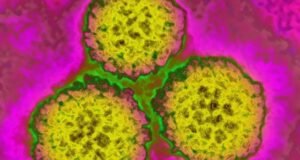
Common cold symptoms can drag, leaving sufferers with a lingering cough, stomach pain, and diarrhea for weeks, scientists found. In a study aimed at better understanding the pandemic’s effects, researchers at Queen Mary University of London found a subset of patients not infected with SARS-CoV-2, but who caught another respiratory bug, reported symptoms lasting at least four weeks, reminiscent of the long Covid condition plaguing at least 10% of coronavirus cases.
The rapid spread of SARS-CoV-2, reported to have infected more than 770 million people worldwide, provided a rare opportunity to understand the myriad, enduring biological consequences of a novel virus and focused attention on other post-acute infection syndromes. The new research, published Friday in the journal eClinicalMedicine, suggests long-lasting health impacts from influenza, pneumonia and other respiratory infections may be going unrecognized.
“A lack of awareness — or even the lack of a common term — prevents both reporting and diagnosis of these conditions,” Giulia Vivaldi, the study’s lead author, said. “We need to take the opportunity to investigate and consider the lasting effects of other acute respiratory infections.”
Protracted post-acute illnesses are difficult to identify and treat because tests aren’t yet available to diagnose the complex condition, which is associated with more than 200 symptoms in long Covid alone, Vivaldi said. The researchers said they don’t yet know if post-acute symptoms from other respiratory infections have a similar duration to long Covid.
While the severity of the acute illness appeared to be a key driver of risk of long-term symptoms, more research is needed to establish why some people suffer extended symptoms and others don’t.
The community-based study analyzed data for 16 potential long Covid symptoms reported in early 2021 by more than 10,000 UK adults unvaccinated against SARS-CoV-2. Most participants were older white women, which, the researchers said, might limit how generalizable the findings are to other groups.
Lightheaded, Dizzy
Long-term symptom profiles differed slightly between those who had Covid and those who had another respiratory infection, with Covid patients having greater increases in problems with taste or smell, and lightheadedness or dizziness, the research found.
Such studies are “critical first steps” in unraveling how the impact of SARS-CoV-2 differs from other acute respiratory infections that can have prolonged, disabling effects across multiple organ systems, said Mady Hornig, an associate professor of epidemiology at Columbia University’s Mailman School of Public Health in New York, who researches post-acute infection syndromes, but wasn’t involved in the UK study.
Although the study found more similarities than differences between the infection groups, no conclusions can be made about any overlap in the biological mechanisms of the health effects, Hornig said in an email. It’s also important that future studies gather serial data on symptoms of “special concern” in long Covid, reflecting blood-clotting and blood-flow abnormalities, and deterioration upon exertion, she said.
“Understanding the full range of symptoms and their trajectories is critical to our capacity to discover the treatments needed to address and eradicate all of these disabling conditions, and to tailor our treatments to each patient accordingly,” she said.
 Weekly Bangla Mirror | Bangla Mirror, Bangladeshi news in UK, bangla mirror news
Weekly Bangla Mirror | Bangla Mirror, Bangladeshi news in UK, bangla mirror news







